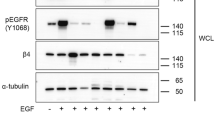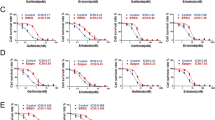Abstract
Transforming Growth Factor-[beta] (TGF-[beta]) and Epidermal Growth Factor (EGF) signaling pathways are both independently implicated as key regulators in tumor formation and progression. Here, we demonstrate that activation of the tumor-associated and over-expressed EGFR desensitizes TGF-[beta] signaling and its cytostatic regulation through specific Stat3 activation and Smad7 induction. In normal and tumor human cell lines, reduction of TGF-[beta]-mediated Smad2 phosphorylation, nuclear translocation and Smad3 target gene activation were observed where EGFR is over-expressed, but not in cells which expressed EGFR at normal levels. The EGFR downstream signaling molecules phosphatidyinositol-3 Kinase (PI3K) or mitogen-activated protein kinase/ERK kinase (MEK) are not responsible for the down-regulation of TGF-[beta] signaling since blockade of them by specific pharmacological inhibitors LY294002 and U0126 had little effects on the sensitivity of TGF-[beta] signaling. We identified Stat3 as a signaling molecule activated specifically and persistently by over-expressed EGFR, but not by normal levels. Importantly, Stat3 is responsible for the reduced TGF-[beta] sensitivity, since its knockdown by siRNA restored TGF-[beta] signaling sensitivity. Furthermore, over-expressed EGFR, through Stat3 activates Smad7 promoter activity, increasing its protein levels, which is a negative regulator of TGF-[beta] signaling. Consequently, cells were re-sensitized to TGF-[beta] when Smad7 expression was reduced using siRNA. Therefore we establish a novel EGFR-Stat3-Smad7-TGF-[beta] signaling molecular axis where tumor-associated over-expression of EGFR in epithelial cells results in hyperactivation of Stat3, which activates Smad7 expression, compromising the TGF-[beta]'s cytostatic regulation of epithelium and consequent tumor formation.
Similar content being viewed by others
Article PDF
Author information
Authors and Affiliations
Corresponding author
Rights and permissions
About this article
Cite this article
Luwor, R., Taylor, L., Wang, B. et al. Tumor-associated EGFR over-expression specifically activates Stat3 and Smad7 resulting in desensitization of TGF-β signaling. Nat Prec (2008). https://doi.org/10.1038/npre.2008.1535.1
Received:
Accepted:
Published:
DOI: https://doi.org/10.1038/npre.2008.1535.1



